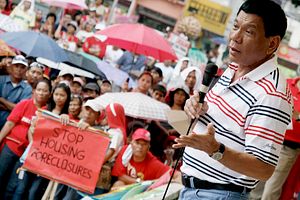Controversial, tough-talking mayor Rodrigo Duterte has registered a big win in the Philippine presidential elections according to a certified poll monitor, sparking worries about the future of reform gains realized under his predecessor Benigno Aquino III.
With more than 89 percent of the vote counted in Southeast Asia’s second-most populous country on early Tuesday morning local time, Duterte had captured over 15 million votes or 38.7 percent of total votes according to the Parish Pastoral Council for Responsible Voting (PPCRV), a Catholic Church-run poll monitor accredited by the government to tally the ballots.
The result put Duterte more than 6 million votes or over 15 percent ahead of his nearest rival, Aquino’s handpicked successor Mar Roxas, an unassailable lead that was even higher than the double-digit leads he enjoyed coming into polls on Monday. First-term senator Grace Poe, who had been the frontrunner for a brief period before Duterte’s late surge in polls in April, came in at a close third. In the Philippines, the candidate with the most votes wins even without a clear majority.
While the count is still unofficial, the significant lead means the mayor of the southern city of Davao is all but certain to have handily won the contest to succeed Aquino, whose six-year term ends June 30. Earlier, with results still streaming in Monday night after polls closed, Duterte had struck a rather humble note in his remarks which departed from some of the more incendiary and controversial remarks heard during his campaign that had earned him comparisons to the U.S. Republican Party presumptive nominee Donald Trump.
“It’s with humility, extreme humility, that I accept this, the mandate of the people,” Duterte told the news wire service AFP
“What I can promise you is that I will do my very best not just in my waking hours but even in my sleep.”
Duterte had surged in the polls on a brash, anti-establishment platform, touting his tough approach against crime in Davao despite the fact that brutal death squads are said to have claimed the lives of more than 1,000 people during his tenure. Nicknamed ‘The Punisher,’ he has also made a string of controversial comments along the way, including a joke that, as mayor, he should have been the first to rape an Australian missionary murdered in a prison riot.
Duterte’s critics have warned that his victory could threaten the significant political and economic progress made under Aquino since 2010 and see the return of dictatorial rule to the Philippines. Under the reform-minded Aquino, the Philippines, known as the sick man of Asia, had emerged as one of Asia’s fastest growing economies and a frontline state resisting China’s growing assertiveness in the South China Sea disputes, filing a case against Beijing with a verdict expected this month or next (See: “Will the Philippines’ Next President Maintain Aquino’s Reform Momentum?”). Philippine presidents are only allowed one six-year term.
But Aquino’s detractors have argued that the gains from economic growth have not been widely enjoyed, while endemic problems like corruption, poverty, inequality and crime still remain.
































